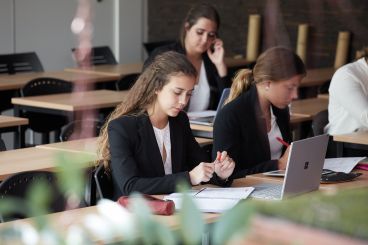
The pandemic has changed the world. Many businesses had to slow down or temporarily closed their businesses due to the pandemic, especially in the hospitality industry. This situation can be viewed as a crisis, or an opportunity for the hospitality industry and the education sector to transform and embrace the digitalization age.
Trends Reshaping Hospitality education
According to the white paper released by Sommet Education in January, among many trends that have been identified affirming their role in the hospitality education sector this year, digitalization is one of them. Along with personalization and life-long learning, it is one of the most significant trends.
In the recent years, digitalization has integrated many aspects of the education world, with hospitality education being no exception. The emerging economy is based on knowledge as a key factor of production and the industries demand the employees remain highly trained in science and technology.
Using advanced information and communications technologies students have now access to various tools making education accessible from anywhere in the world. With online courses, online assessments and digital textbooks, education has become more accessible remotely and now allow adjusting the pace of studies to each student’s particular needs.
Digital education helps students to gather knowledge in easier and different ways than before. Moreover, since the introduction of animation, the information can be absorbed in a much faster and understandable manner. Even the toughest topics can be presented in a simplified way with the help of animation.
Another charismatic change that has transformed the education sector is social networking. In terms of digital education social networks contribute to a good portion of education allowing the students to exchange the information and consult in smaller groups regardless of their location. This has also been greatly adopted by the institutions of the hospitality education, especially since many of them were forced to close their campuses due to the pandemic. Allowing the students and faculty to exchange using the social platforms or platforms based on similar models, it has helped to continue providing education and increase the knowledge besides social communication.
Disruptions post and beyond corona
With the outbreak of COVID-19 causing many educational institutions worldwide to close temporarily, a large number of educational institutions had to turn to remote learning and find creative and innovative ways to provide their students with education regardless of their location and time zone.
Previously often an addition to or core of some institutions’ business models, remote learning has now become a necessity with the need to be implemented rapidly after the announcements to close campuses by many public authorities worldwide. The shift to remote means not only bringing the curriculum online, but also using the latest technologies such as Virtual Reality and Artificial Intelligence to enhance the study experience in order to maintain and ideally exceed the level of standards of the affected institutions.
Switching to remote learning also means mobilizing the existing faculty resources and generating content which is essential for the transfer of the information from teacher to student. Going digital and replacing large classrooms with smaller study groups allows for a more horizontal method of teaching. Digital learning imparts some of the essential knowledge, which faculty can then discuss, reinforce and validate in a more open and collaborative classroom environment allowing additional focus on mentoring and nurturing the students.
While using digital tools for education has proven to be successful for many institutions and has allowed to continue their core mission of providing education to a student body, it is undeniable that the traditional methods of learning involving presence in the classroom and on campus are essential for maintaining and developing interpersonal relationships and social and soft skills.
Moreover, many practical art classes cannot be entirely replaced by online courses proving that the education model of the future could as well be a combination of both, classroom and remote learning.
Where is hospitality education sector heading in the near future?
Another technology rising in popularity in the education world, is Artificial Intelligence (AI). According to Statista (2020), AI will undergo a massive growth in market value, going from 22.59 billion USD this year to 118.6 billion in 2025. This technology enables educators to analyze the performance of students in order to provide them with a tailored academic program in terms of content, pace and level of mastery.
In the education system, Artificial Intelligence is currently used through conversational interfaces such as chatbots, messaging platforms, and virtual assistants. Additionally, it can also be used to ensure the integrity of the assessments by implementing special systems allowing to control the plagiarism during online assessments by using artificial intelligence to record and analyze the study scene and report any atypical behavior.
Among others, Virtual Reality (VR) is a technology that has the potential to transform education massively in the future. It has proven itself as an impressive learning tool that can make teaching fun and engaging. Instead of teaching students the history of ancient Rome from a textbook, they can just put on the VR headset and experience Rome for themselves. For instance, at the brain and behavior laboratory of the University of Geneva, researchers have the possibility to use an immersive virtual reality system to investigate complex behaviors in realistic scenes. The system is able to manipulate visual, auditory, and olfactory sensations while tracking the eyes, head, and body movements of the participant. Controlled by researchers, this tool can give a user a full immersion to a virtual world.
While digitalization has been foreseen as a trend shaping the education, it has become a necessity with the COVID-19 crisis being a catalyzer of the digital transformation in the education world.
COVID 19: Hospitality education continues to remain a core challenge
Education has always played an important role of building the future of the world economy. With the travel and tourism industries being one of the most hit due to the COVID-19 outbreak worldwide, the role of the hospitality education has become one of the most essential education fields responsible for providing the young professionals with the necessary skills to rebuild the global economy.
The hospitality industry, amounting to 10.4% of global GDP, will also see one of the greatest recoveries with the hospitality education graduates taking part in the opportunity to reinvent the hospitality sector of the future.

